Negotiation & Conflict Management: Reflective Analysis of an Incident
VerifiedAdded on 2023/06/11
|9
|1819
|125
Essay
AI Summary
This essay presents a reflective analysis of a workplace negotiation incident, applying concepts and frameworks from a Negotiation and Conflict Management (NCM) course. The scenario involves an assistant manager taking on additional responsibilities without commensurate compensation, leading to a negotiation with the employer. The analysis covers key elements such as the bargaining mix, assessing the target and resistance points of both parties, opening offers and stances, different frames, the role of concessions, and potential hardball tactics employed by the company. It further explores the impact of perception, cognition, and emotion on the negotiation process, including cognitive biases and perceptual distortions. The essay also discusses the importance of communication, power dynamics, ethics, and trust in negotiation, emphasizing the need for a negotiator to build relationships and understand the counterpart's biases to achieve a mutually satisfying agreement. The essay concludes by highlighting the significance of developing strong negotiation skills for effective deal-making.

NEGOTIATION
Student’s Name
Institution Affiliation
Date
Student’s Name
Institution Affiliation
Date
Paraphrase This Document
Need a fresh take? Get an instant paraphrase of this document with our AI Paraphraser
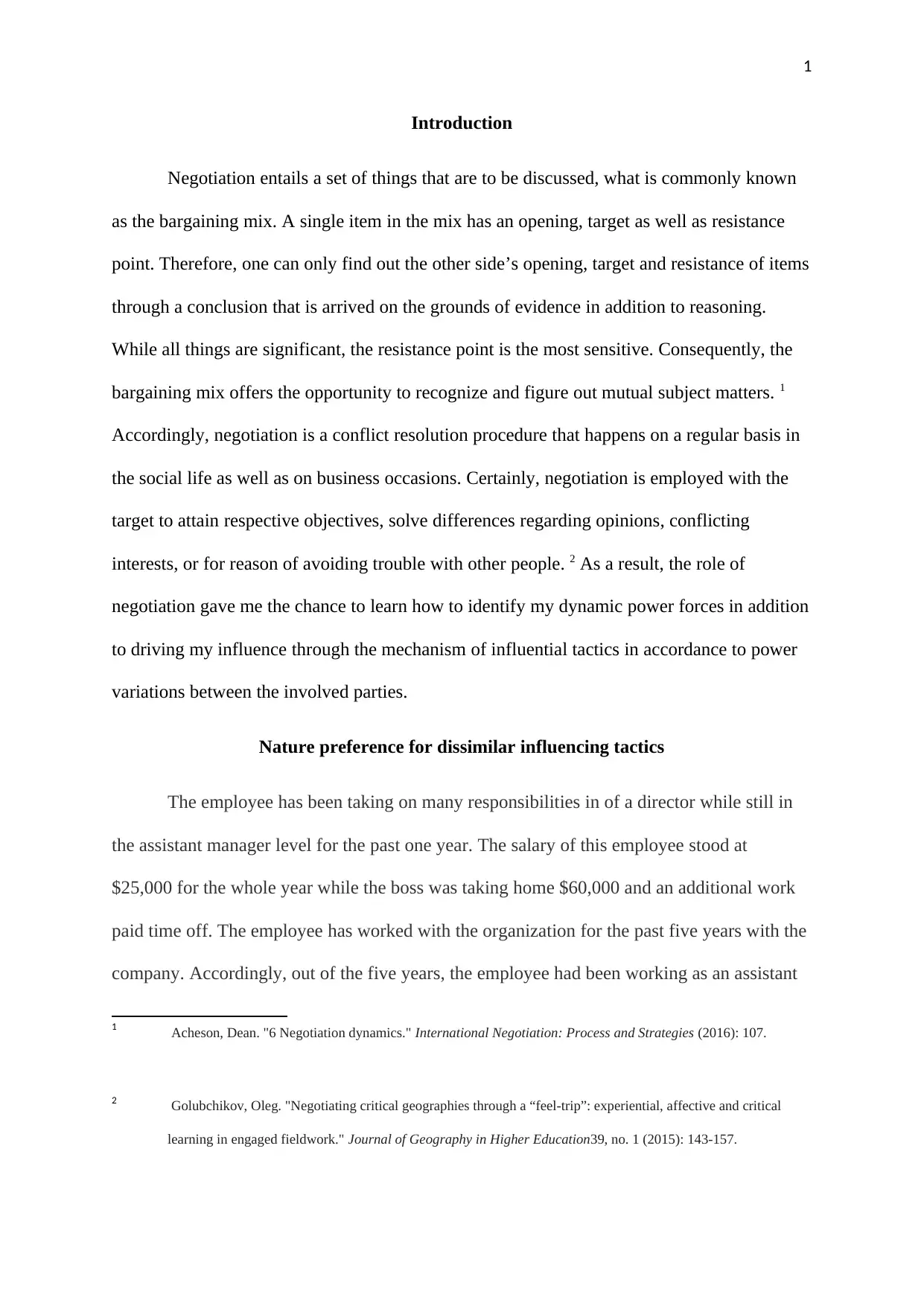
1
Introduction
Negotiation entails a set of things that are to be discussed, what is commonly known
as the bargaining mix. A single item in the mix has an opening, target as well as resistance
point. Therefore, one can only find out the other side’s opening, target and resistance of items
through a conclusion that is arrived on the grounds of evidence in addition to reasoning.
While all things are significant, the resistance point is the most sensitive. Consequently, the
bargaining mix offers the opportunity to recognize and figure out mutual subject matters. 1
Accordingly, negotiation is a conflict resolution procedure that happens on a regular basis in
the social life as well as on business occasions. Certainly, negotiation is employed with the
target to attain respective objectives, solve differences regarding opinions, conflicting
interests, or for reason of avoiding trouble with other people. 2 As a result, the role of
negotiation gave me the chance to learn how to identify my dynamic power forces in addition
to driving my influence through the mechanism of influential tactics in accordance to power
variations between the involved parties.
Nature preference for dissimilar influencing tactics
The employee has been taking on many responsibilities in of a director while still in
the assistant manager level for the past one year. The salary of this employee stood at
$25,000 for the whole year while the boss was taking home $60,000 and an additional work
paid time off. The employee has worked with the organization for the past five years with the
company. Accordingly, out of the five years, the employee had been working as an assistant
1 Acheson, Dean. "6 Negotiation dynamics." International Negotiation: Process and Strategies (2016): 107.
2 Golubchikov, Oleg. "Negotiating critical geographies through a “feel-trip”: experiential, affective and critical
learning in engaged fieldwork." Journal of Geography in Higher Education39, no. 1 (2015): 143-157.
Introduction
Negotiation entails a set of things that are to be discussed, what is commonly known
as the bargaining mix. A single item in the mix has an opening, target as well as resistance
point. Therefore, one can only find out the other side’s opening, target and resistance of items
through a conclusion that is arrived on the grounds of evidence in addition to reasoning.
While all things are significant, the resistance point is the most sensitive. Consequently, the
bargaining mix offers the opportunity to recognize and figure out mutual subject matters. 1
Accordingly, negotiation is a conflict resolution procedure that happens on a regular basis in
the social life as well as on business occasions. Certainly, negotiation is employed with the
target to attain respective objectives, solve differences regarding opinions, conflicting
interests, or for reason of avoiding trouble with other people. 2 As a result, the role of
negotiation gave me the chance to learn how to identify my dynamic power forces in addition
to driving my influence through the mechanism of influential tactics in accordance to power
variations between the involved parties.
Nature preference for dissimilar influencing tactics
The employee has been taking on many responsibilities in of a director while still in
the assistant manager level for the past one year. The salary of this employee stood at
$25,000 for the whole year while the boss was taking home $60,000 and an additional work
paid time off. The employee has worked with the organization for the past five years with the
company. Accordingly, out of the five years, the employee had been working as an assistant
1 Acheson, Dean. "6 Negotiation dynamics." International Negotiation: Process and Strategies (2016): 107.
2 Golubchikov, Oleg. "Negotiating critical geographies through a “feel-trip”: experiential, affective and critical
learning in engaged fieldwork." Journal of Geography in Higher Education39, no. 1 (2015): 143-157.
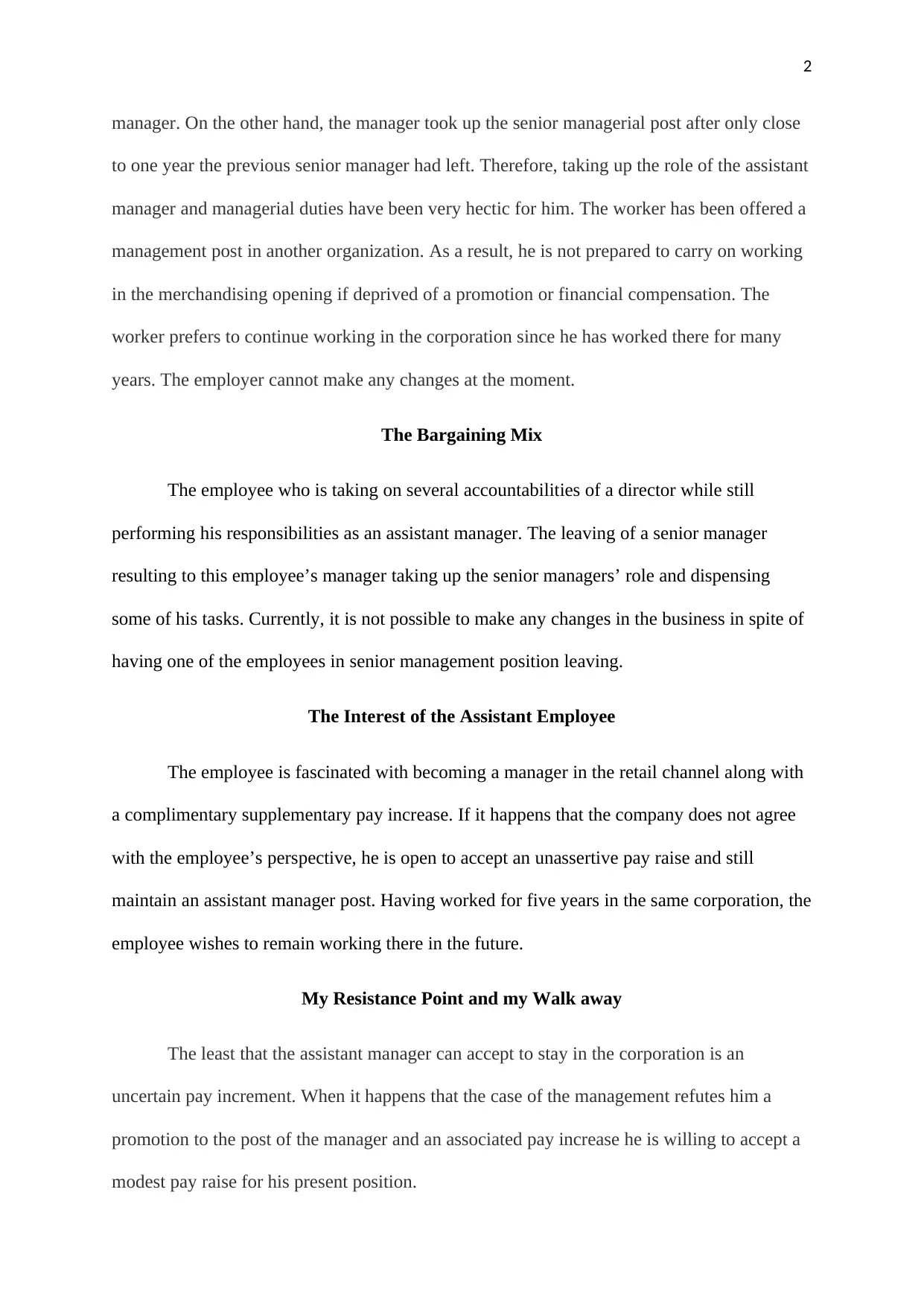
2
manager. On the other hand, the manager took up the senior managerial post after only close
to one year the previous senior manager had left. Therefore, taking up the role of the assistant
manager and managerial duties have been very hectic for him. The worker has been offered a
management post in another organization. As a result, he is not prepared to carry on working
in the merchandising opening if deprived of a promotion or financial compensation. The
worker prefers to continue working in the corporation since he has worked there for many
years. The employer cannot make any changes at the moment.
The Bargaining Mix
The employee who is taking on several accountabilities of a director while still
performing his responsibilities as an assistant manager. The leaving of a senior manager
resulting to this employee’s manager taking up the senior managers’ role and dispensing
some of his tasks. Currently, it is not possible to make any changes in the business in spite of
having one of the employees in senior management position leaving.
The Interest of the Assistant Employee
The employee is fascinated with becoming a manager in the retail channel along with
a complimentary supplementary pay increase. If it happens that the company does not agree
with the employee’s perspective, he is open to accept an unassertive pay raise and still
maintain an assistant manager post. Having worked for five years in the same corporation, the
employee wishes to remain working there in the future.
My Resistance Point and my Walk away
The least that the assistant manager can accept to stay in the corporation is an
uncertain pay increment. When it happens that the case of the management refutes him a
promotion to the post of the manager and an associated pay increase he is willing to accept a
modest pay raise for his present position.
manager. On the other hand, the manager took up the senior managerial post after only close
to one year the previous senior manager had left. Therefore, taking up the role of the assistant
manager and managerial duties have been very hectic for him. The worker has been offered a
management post in another organization. As a result, he is not prepared to carry on working
in the merchandising opening if deprived of a promotion or financial compensation. The
worker prefers to continue working in the corporation since he has worked there for many
years. The employer cannot make any changes at the moment.
The Bargaining Mix
The employee who is taking on several accountabilities of a director while still
performing his responsibilities as an assistant manager. The leaving of a senior manager
resulting to this employee’s manager taking up the senior managers’ role and dispensing
some of his tasks. Currently, it is not possible to make any changes in the business in spite of
having one of the employees in senior management position leaving.
The Interest of the Assistant Employee
The employee is fascinated with becoming a manager in the retail channel along with
a complimentary supplementary pay increase. If it happens that the company does not agree
with the employee’s perspective, he is open to accept an unassertive pay raise and still
maintain an assistant manager post. Having worked for five years in the same corporation, the
employee wishes to remain working there in the future.
My Resistance Point and my Walk away
The least that the assistant manager can accept to stay in the corporation is an
uncertain pay increment. When it happens that the case of the management refutes him a
promotion to the post of the manager and an associated pay increase he is willing to accept a
modest pay raise for his present position.
⊘ This is a preview!⊘
Do you want full access?
Subscribe today to unlock all pages.

Trusted by 1+ million students worldwide
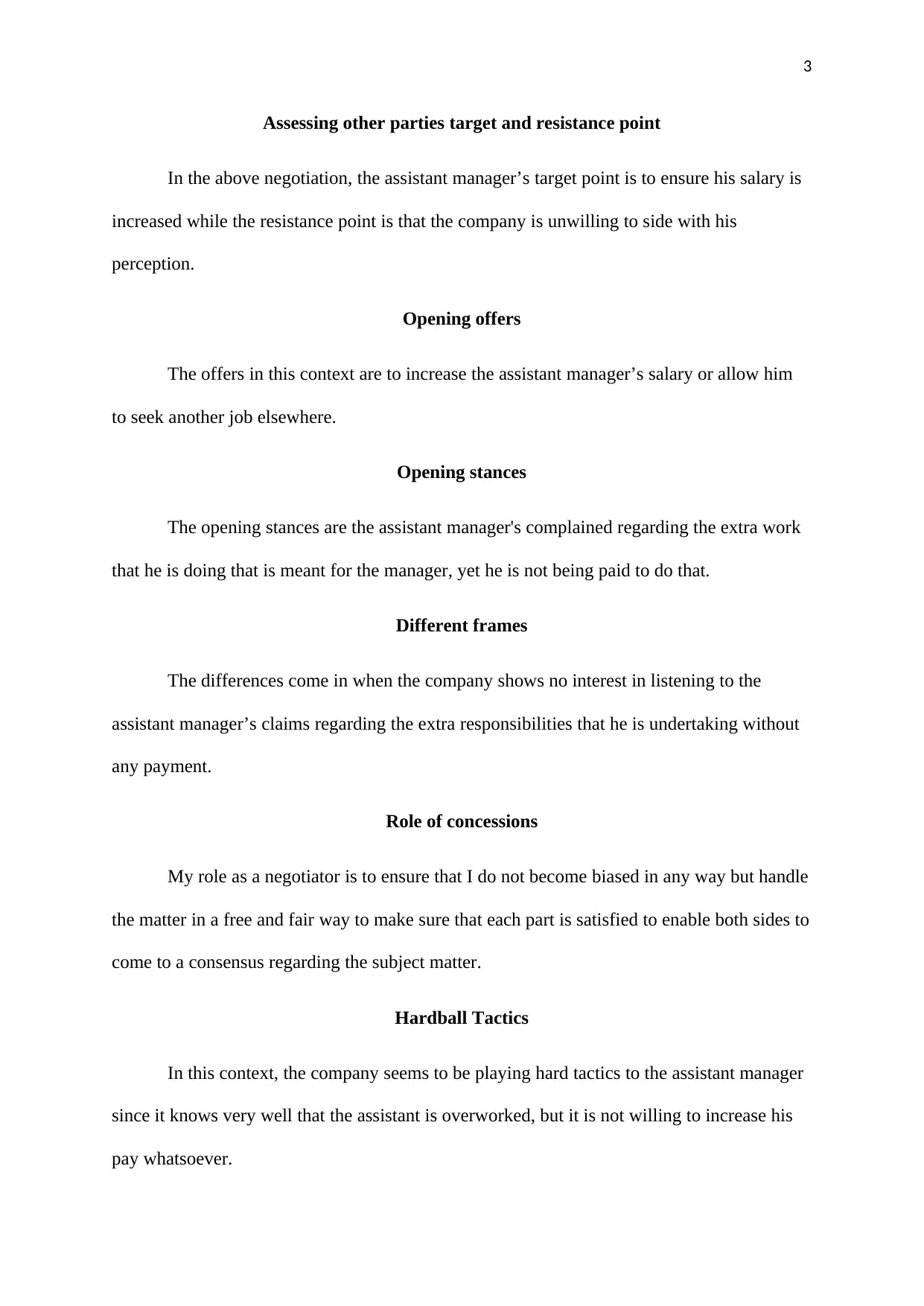
3
Assessing other parties target and resistance point
In the above negotiation, the assistant manager’s target point is to ensure his salary is
increased while the resistance point is that the company is unwilling to side with his
perception.
Opening offers
The offers in this context are to increase the assistant manager’s salary or allow him
to seek another job elsewhere.
Opening stances
The opening stances are the assistant manager's complained regarding the extra work
that he is doing that is meant for the manager, yet he is not being paid to do that.
Different frames
The differences come in when the company shows no interest in listening to the
assistant manager’s claims regarding the extra responsibilities that he is undertaking without
any payment.
Role of concessions
My role as a negotiator is to ensure that I do not become biased in any way but handle
the matter in a free and fair way to make sure that each part is satisfied to enable both sides to
come to a consensus regarding the subject matter.
Hardball Tactics
In this context, the company seems to be playing hard tactics to the assistant manager
since it knows very well that the assistant is overworked, but it is not willing to increase his
pay whatsoever.
Assessing other parties target and resistance point
In the above negotiation, the assistant manager’s target point is to ensure his salary is
increased while the resistance point is that the company is unwilling to side with his
perception.
Opening offers
The offers in this context are to increase the assistant manager’s salary or allow him
to seek another job elsewhere.
Opening stances
The opening stances are the assistant manager's complained regarding the extra work
that he is doing that is meant for the manager, yet he is not being paid to do that.
Different frames
The differences come in when the company shows no interest in listening to the
assistant manager’s claims regarding the extra responsibilities that he is undertaking without
any payment.
Role of concessions
My role as a negotiator is to ensure that I do not become biased in any way but handle
the matter in a free and fair way to make sure that each part is satisfied to enable both sides to
come to a consensus regarding the subject matter.
Hardball Tactics
In this context, the company seems to be playing hard tactics to the assistant manager
since it knows very well that the assistant is overworked, but it is not willing to increase his
pay whatsoever.
Paraphrase This Document
Need a fresh take? Get an instant paraphrase of this document with our AI Paraphraser
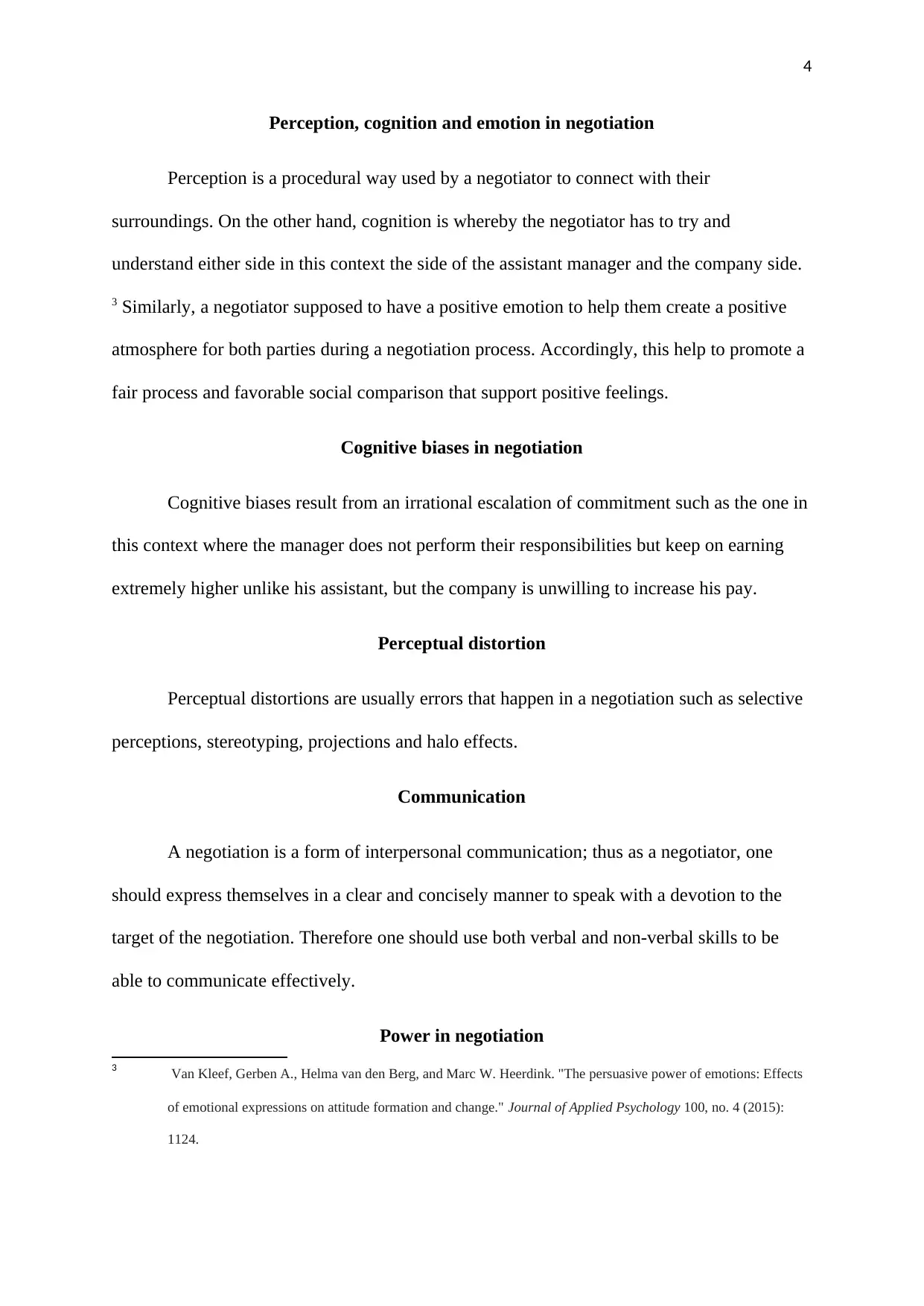
4
Perception, cognition and emotion in negotiation
Perception is a procedural way used by a negotiator to connect with their
surroundings. On the other hand, cognition is whereby the negotiator has to try and
understand either side in this context the side of the assistant manager and the company side.
3 Similarly, a negotiator supposed to have a positive emotion to help them create a positive
atmosphere for both parties during a negotiation process. Accordingly, this help to promote a
fair process and favorable social comparison that support positive feelings.
Cognitive biases in negotiation
Cognitive biases result from an irrational escalation of commitment such as the one in
this context where the manager does not perform their responsibilities but keep on earning
extremely higher unlike his assistant, but the company is unwilling to increase his pay.
Perceptual distortion
Perceptual distortions are usually errors that happen in a negotiation such as selective
perceptions, stereotyping, projections and halo effects.
Communication
A negotiation is a form of interpersonal communication; thus as a negotiator, one
should express themselves in a clear and concisely manner to speak with a devotion to the
target of the negotiation. Therefore one should use both verbal and non-verbal skills to be
able to communicate effectively.
Power in negotiation
3 Van Kleef, Gerben A., Helma van den Berg, and Marc W. Heerdink. "The persuasive power of emotions: Effects
of emotional expressions on attitude formation and change." Journal of Applied Psychology 100, no. 4 (2015):
1124.
Perception, cognition and emotion in negotiation
Perception is a procedural way used by a negotiator to connect with their
surroundings. On the other hand, cognition is whereby the negotiator has to try and
understand either side in this context the side of the assistant manager and the company side.
3 Similarly, a negotiator supposed to have a positive emotion to help them create a positive
atmosphere for both parties during a negotiation process. Accordingly, this help to promote a
fair process and favorable social comparison that support positive feelings.
Cognitive biases in negotiation
Cognitive biases result from an irrational escalation of commitment such as the one in
this context where the manager does not perform their responsibilities but keep on earning
extremely higher unlike his assistant, but the company is unwilling to increase his pay.
Perceptual distortion
Perceptual distortions are usually errors that happen in a negotiation such as selective
perceptions, stereotyping, projections and halo effects.
Communication
A negotiation is a form of interpersonal communication; thus as a negotiator, one
should express themselves in a clear and concisely manner to speak with a devotion to the
target of the negotiation. Therefore one should use both verbal and non-verbal skills to be
able to communicate effectively.
Power in negotiation
3 Van Kleef, Gerben A., Helma van den Berg, and Marc W. Heerdink. "The persuasive power of emotions: Effects
of emotional expressions on attitude formation and change." Journal of Applied Psychology 100, no. 4 (2015):
1124.
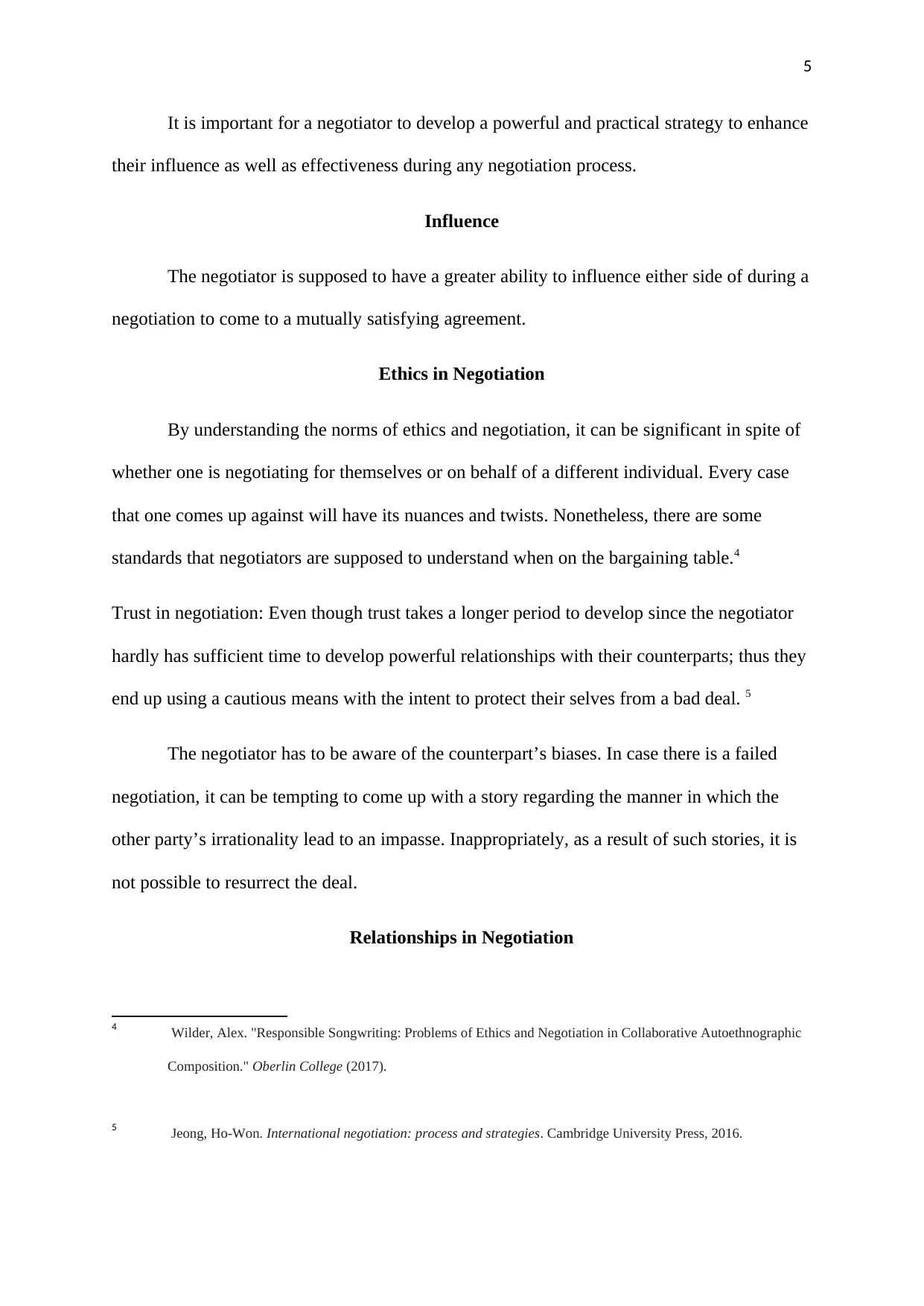
5
It is important for a negotiator to develop a powerful and practical strategy to enhance
their influence as well as effectiveness during any negotiation process.
Influence
The negotiator is supposed to have a greater ability to influence either side of during a
negotiation to come to a mutually satisfying agreement.
Ethics in Negotiation
By understanding the norms of ethics and negotiation, it can be significant in spite of
whether one is negotiating for themselves or on behalf of a different individual. Every case
that one comes up against will have its nuances and twists. Nonetheless, there are some
standards that negotiators are supposed to understand when on the bargaining table.4
Trust in negotiation: Even though trust takes a longer period to develop since the negotiator
hardly has sufficient time to develop powerful relationships with their counterparts; thus they
end up using a cautious means with the intent to protect their selves from a bad deal. 5
The negotiator has to be aware of the counterpart’s biases. In case there is a failed
negotiation, it can be tempting to come up with a story regarding the manner in which the
other party’s irrationality lead to an impasse. Inappropriately, as a result of such stories, it is
not possible to resurrect the deal.
Relationships in Negotiation
4 Wilder, Alex. "Responsible Songwriting: Problems of Ethics and Negotiation in Collaborative Autoethnographic
Composition." Oberlin College (2017).
5 Jeong, Ho-Won. International negotiation: process and strategies. Cambridge University Press, 2016.
It is important for a negotiator to develop a powerful and practical strategy to enhance
their influence as well as effectiveness during any negotiation process.
Influence
The negotiator is supposed to have a greater ability to influence either side of during a
negotiation to come to a mutually satisfying agreement.
Ethics in Negotiation
By understanding the norms of ethics and negotiation, it can be significant in spite of
whether one is negotiating for themselves or on behalf of a different individual. Every case
that one comes up against will have its nuances and twists. Nonetheless, there are some
standards that negotiators are supposed to understand when on the bargaining table.4
Trust in negotiation: Even though trust takes a longer period to develop since the negotiator
hardly has sufficient time to develop powerful relationships with their counterparts; thus they
end up using a cautious means with the intent to protect their selves from a bad deal. 5
The negotiator has to be aware of the counterpart’s biases. In case there is a failed
negotiation, it can be tempting to come up with a story regarding the manner in which the
other party’s irrationality lead to an impasse. Inappropriately, as a result of such stories, it is
not possible to resurrect the deal.
Relationships in Negotiation
4 Wilder, Alex. "Responsible Songwriting: Problems of Ethics and Negotiation in Collaborative Autoethnographic
Composition." Oberlin College (2017).
5 Jeong, Ho-Won. International negotiation: process and strategies. Cambridge University Press, 2016.
⊘ This is a preview!⊘
Do you want full access?
Subscribe today to unlock all pages.

Trusted by 1+ million students worldwide
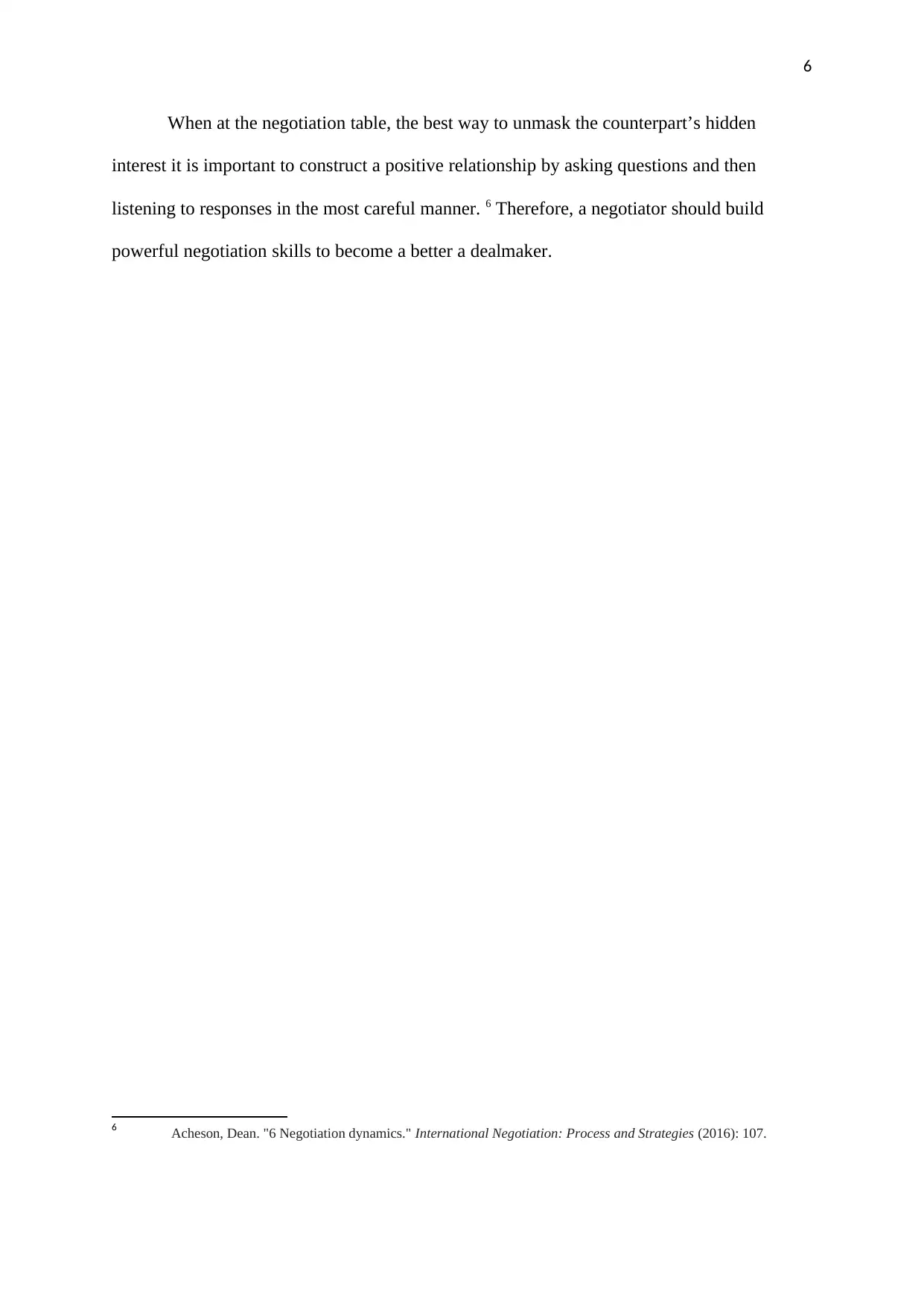
6
When at the negotiation table, the best way to unmask the counterpart’s hidden
interest it is important to construct a positive relationship by asking questions and then
listening to responses in the most careful manner. 6 Therefore, a negotiator should build
powerful negotiation skills to become a better a dealmaker.
6 Acheson, Dean. "6 Negotiation dynamics." International Negotiation: Process and Strategies (2016): 107.
When at the negotiation table, the best way to unmask the counterpart’s hidden
interest it is important to construct a positive relationship by asking questions and then
listening to responses in the most careful manner. 6 Therefore, a negotiator should build
powerful negotiation skills to become a better a dealmaker.
6 Acheson, Dean. "6 Negotiation dynamics." International Negotiation: Process and Strategies (2016): 107.
Paraphrase This Document
Need a fresh take? Get an instant paraphrase of this document with our AI Paraphraser
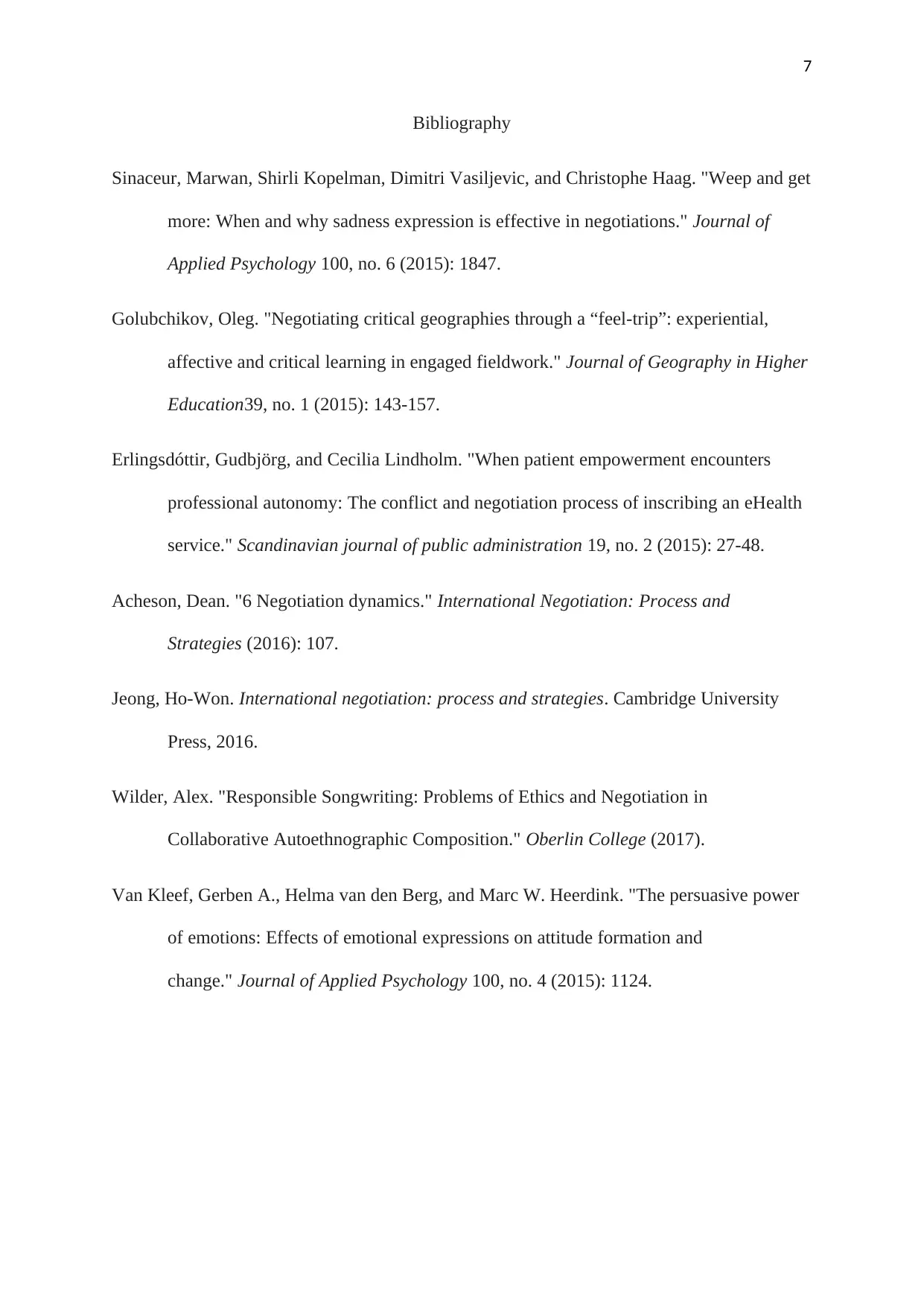
7
Bibliography
Sinaceur, Marwan, Shirli Kopelman, Dimitri Vasiljevic, and Christophe Haag. "Weep and get
more: When and why sadness expression is effective in negotiations." Journal of
Applied Psychology 100, no. 6 (2015): 1847.
Golubchikov, Oleg. "Negotiating critical geographies through a “feel-trip”: experiential,
affective and critical learning in engaged fieldwork." Journal of Geography in Higher
Education39, no. 1 (2015): 143-157.
Erlingsdóttir, Gudbjörg, and Cecilia Lindholm. "When patient empowerment encounters
professional autonomy: The conflict and negotiation process of inscribing an eHealth
service." Scandinavian journal of public administration 19, no. 2 (2015): 27-48.
Acheson, Dean. "6 Negotiation dynamics." International Negotiation: Process and
Strategies (2016): 107.
Jeong, Ho-Won. International negotiation: process and strategies. Cambridge University
Press, 2016.
Wilder, Alex. "Responsible Songwriting: Problems of Ethics and Negotiation in
Collaborative Autoethnographic Composition." Oberlin College (2017).
Van Kleef, Gerben A., Helma van den Berg, and Marc W. Heerdink. "The persuasive power
of emotions: Effects of emotional expressions on attitude formation and
change." Journal of Applied Psychology 100, no. 4 (2015): 1124.
Bibliography
Sinaceur, Marwan, Shirli Kopelman, Dimitri Vasiljevic, and Christophe Haag. "Weep and get
more: When and why sadness expression is effective in negotiations." Journal of
Applied Psychology 100, no. 6 (2015): 1847.
Golubchikov, Oleg. "Negotiating critical geographies through a “feel-trip”: experiential,
affective and critical learning in engaged fieldwork." Journal of Geography in Higher
Education39, no. 1 (2015): 143-157.
Erlingsdóttir, Gudbjörg, and Cecilia Lindholm. "When patient empowerment encounters
professional autonomy: The conflict and negotiation process of inscribing an eHealth
service." Scandinavian journal of public administration 19, no. 2 (2015): 27-48.
Acheson, Dean. "6 Negotiation dynamics." International Negotiation: Process and
Strategies (2016): 107.
Jeong, Ho-Won. International negotiation: process and strategies. Cambridge University
Press, 2016.
Wilder, Alex. "Responsible Songwriting: Problems of Ethics and Negotiation in
Collaborative Autoethnographic Composition." Oberlin College (2017).
Van Kleef, Gerben A., Helma van den Berg, and Marc W. Heerdink. "The persuasive power
of emotions: Effects of emotional expressions on attitude formation and
change." Journal of Applied Psychology 100, no. 4 (2015): 1124.

8
⊘ This is a preview!⊘
Do you want full access?
Subscribe today to unlock all pages.

Trusted by 1+ million students worldwide
1 out of 9
Related Documents
Your All-in-One AI-Powered Toolkit for Academic Success.
+13062052269
info@desklib.com
Available 24*7 on WhatsApp / Email
![[object Object]](/_next/static/media/star-bottom.7253800d.svg)
Unlock your academic potential
Copyright © 2020–2026 A2Z Services. All Rights Reserved. Developed and managed by ZUCOL.



